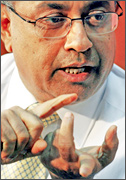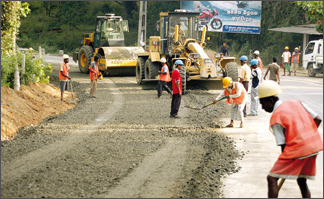Arming the future with development
Finance Ministry Secretary Dr. P. B.
Jayasundera was interviewed recently on the SLBC’s Subharathi program by
SLBC Chairman Hudson Samarasinghe. Here are some excerpts from the
interview.
Q: What is the duty of a leader of
the State? Should he work with an eye on the next election or work for
the benefit of the future generation?
|

Dr. P. B. Jayasundera |
A: A leader should have a
clear understanding of the hopes and aspirations of his people. A
foremost desire of the people is to uplift the social, moral and
cultural values of the future generation. While being sensitive to short
term problems of the people he should ensure the long term development
and welfare of the nation without sacrificing it for short term gains. A
leader should always think of his responsibilities towards the future
generation.
Q: What role has the Mahinda
Rajapaksa Government played for the future welfare of the nation?
A: The President as soon
as he assumed office took over the responsibility of steering the future
course of the nation. In his capacity as Finance Minister he paid
attention to the large number of development projects which had failed
to take off ground. Under the 10-year Mahinda Chinthana program
development projects have been implemented in many fields including
irrigation, highways, posts and airports. Large scale development
projects are under way on a countrywide scale today without being
restricted to Colombo only. Each village is getting at least a concreted
road.
Most people talk of shortcomings today. They are able to talk of
shortcomings because there is development work going apace. Today five
new ports are being built in the country. The capacity of this Colombo
Port is also being increased. All this work will strengthen our economy.
It will also help improve our international relations enabling us to
transact with the outside world more efficiently.
The first thing, investors coming here ask is about the availability
of infrastructure facilities. There has been a great reawakening among
local investors too. Even critics have admitted it.
Infrastructure development will benefit small scale investors and
farmers as well. Roads alone will be insufficient unless ports are
developed for trade. Investors know that the country will not face any
electricity crisis in future because the country is producing
electricity in excess of the demand.
Q: The GSP Plus facility has been a
hot topic of discussion recently. When you and Basil Rajapaksa MP were
assigned to tackle this problem the Opposition Leader made certain
accusations. What is your opinion about this matter?
A: Our Government deals
with many international institutions including the IMF, World Bank, ADB
and other organizations. After the defeat of LTTE terrorism various
programs have been launched to distort the country’s image. These
programs are aimed to disrupt our economy. The Government has taken
steps to clear those misconceptions through the Foreign Ministry at
official level. I and Basil Rajapaksa too were enlisted with the task of
clearing misconceptions and we have succeeded in doing it to a very
great extent.
When explanations are given, decisions should be taken on such
matters not according to political factors but according to
international factors. A state of indecision has been created among
commercial banks too when we go to obtain a commercial loan. We
experienced this situation recently. Although the IMF loan was not
decided on political grounds it was pressurised to a certain extent when
it granted the stand-by facility. We as a nation should work in unison
to correct these things. I think our last trip was a successful one.
Q: Politically there is a lot of
interference on our country. How will it influence the country’s future?
A: It is largely
political. But consideration should be given to economic factors. A
majority of countries in the world practice democracy. Basil Rajapaksa
MP participated in the opening of the country’s future path held in the
European Union.
A member of the European Parliament made a very important speech
regarding strengthening a trade relations with Sri Lanka and it was a
great source of encouragement for us. Two others submitted a report on
it but it was far too one-sided.
Sri Lanka did not submit itself for an investigation because we have
done no wrong. We implemented humanitarian operations to defeat
terrorism considering the trails and tabulations of the people in the
North and East. The Security Forces acted in a responsible manner
without causing problems to innocent civilians.
We implemented an immediate program to cater to the displaced people
and normalise their life. That is why we opposed an investigation. Their
Ambassadors are stationed in this country. The report will go to the
next committee after which it will go to Heads of State level and it is
at that level we hope to get this issue resolved.
|

Infrastructure, the road to development. File photo |
A 180-day accelerated development program is being implemented by a
task force set up in June. A large section of the 300,000 displaced
persons have now been re-settled. It is to protect the displaced that a
security fence has been erected around welfare villages. Every one
visiting these camps have expressed satisfaction about the facilities
provided.
Steps are underway to remove land mines in a 9,000 square km area.
Machinery with Rs. 3,000 million have been imported for this job.
Areas in the North considered as terrorist strongholds have now
returned to normal life. Trade, fishing, transport, banking, schools and
hospitals are now in operation in these areas.
The Government has imported machinery and equipment worth Rs. 150
million for development activities in the North. Large scale Development
projects will be seen in the North within the next two months.
Arrangements are being made to cultivate thousands of acres under paddy
next Maha utilising irrigation facilities from the Yodha Wewa.
Q: Do you hope to implement a program
to help local entrepreneurs?
A: From 2006 the Mahinda
Chinthana has envisaged to strengthen the indigenous economy by
substituting the import economy with a production economy. The first
step is to provide protection to local entrepreneurs from unnecessary
foreign competition. That is why taxes were levied on certain imported
items.
We should create a profitable environment for local farmers if not
they will give up agriculture.
There has been a great reawakening in the agriculture sector during
the last few years. We should carry this forward and give more
protection to farmers as in India. Today rice production has improved
resulting in a decrease in flour-imports. The Government imposed a 20 to
25 percent tax on imported wheat flour to induce local paddy production.
The President is of the view that we should produce our own
requirements of food and other commodities. The Government had reduced
interest on bank loans to encourage investment and local productions.
Today the agriculture, industrial and service sectors have attained
rapid progress. Today the local industrialists and businessmen have
received a good social status. The fertilizer subsidy has been continued
as an impetus to local food production.
Q: How do you take forward plans for
assisting development programs?
A: Earlier Samurdhi
assistance was granted to a large section of the population under the
poverty alleviation program. But today all these people are rebuilding
roads and other infrastructure with collective effort. A large number of
rural electricity schemes and water supply projects are implemented
under the program of taking development to the village. All this will
benefit the future generation.
Q: As Secretary of the Finance
Ministry what is your impression about the character called President
Mahinda Rajapaksa?
A: I came to know
President Rajapaksa in 1994. He acts according to a clear vision. He
highly valued the public service and loved to work with local talent. As
a man from the village he has a clear understanding about the village
economy. He is also aware of the needs of the cities. He has held
several ministerial portfolios and functioned as opposition leader. All
this had not changed his simplicity. He is a person who thinks far ahead
of the times and this has caused a major transformation in the country
in all spheres.
We are a country in the Asian Region with a per capita income of over
2,000 US dollars. In 2004 the per capita income was only 1,000 US
dollars. We also handled the war methodically although we did not have a
large number of planes and helicopters and other armaments like other
nations. President Mahinda Rajapaksa has been able to rebuild all
sectors of the economy. |



